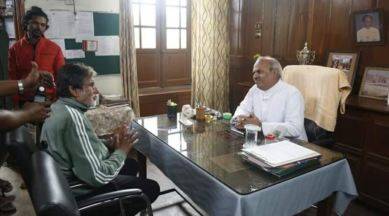For Maharashtra state surveillance officer Dr Pradeep Awate, a two-minute role with Amitabh Bachchan in the recently released Hindi film ‘Jhund’ was a “marvellous learning experience” and he said that the veteran actor ensured that they rehearsed even the smallest of scenes at least three times.
‘Jhund’, based on the life of Vijay Barse, a retired sports teacher who founded an NGO called Slum Soccer, was released on March 4. Barse, played by Bachchan in the film, rehabilitated slum kids by keeping them off drugs and crime and turned them into football players building a whole team.
In the film, I am the principal of a college in Nagpur and my role was essentially to refuse access to the school ground for slum kids. Amitabh Bachchan as a sports teacher is keen on using the ground so that it can help towards the holistic development of children and help build a soccer team. However, even if it was one or two lines, Amitabhji ensured that we rehearsed at least thrice. Despite his stature and experience as an actor, Amitabhji took the effort to ensure a perfect shot,” said Pune-based Dr Awate who was offered a role in the film by director Nagraj Manjule.
“I have known Nagraj since my days as a medical officer in Karmala tehsil of Solapur district. We hail from the same areas. We used to have great conversations and I tried to guide him. He later earned his MA in Marathi literature from the University of Pune and I still recall how my home had become a rendezvous of sorts for these brilliant minds to write the script of their initial films,” recalled Dr Awate.
Fandry’, a 2013 Marathi film, was Manjule’s directorial debut and it centred around the attraction of a Dalit teenage boy towards an ‘upper’ caste girl in a village in Maharashtra. Manjule is best known also for another Marathi film ‘Sairat’ for which he received the national film award in the non-feature film category. Manjule’s first national award-winning shortfilm ‘Pistulya’ focussed on the desire of a Dalit boy to attend school and his inability to do so because of his family’s poverty and a deep-seated disdain for formal education within his community.
Manjule is family for us, Dr Awate said, fondly recalling how he has essayed small roles in each of his films. “For instance, in ‘Sairat’, I am on one of the posters at a cricket competition in the village as a chief guest,” he said.
